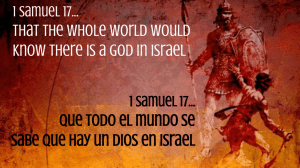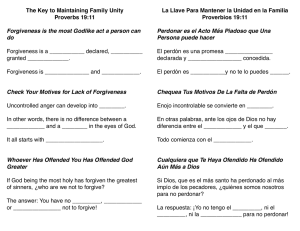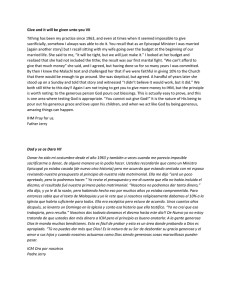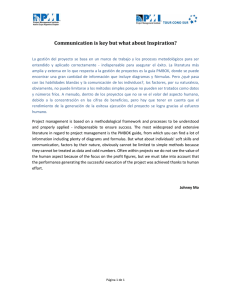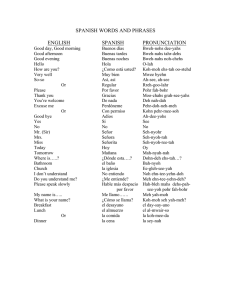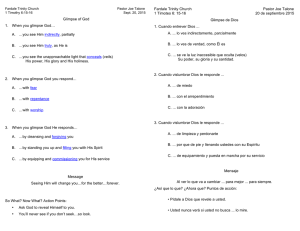April 12, 2015 Second Sunday of Easter—Divine
Anuncio
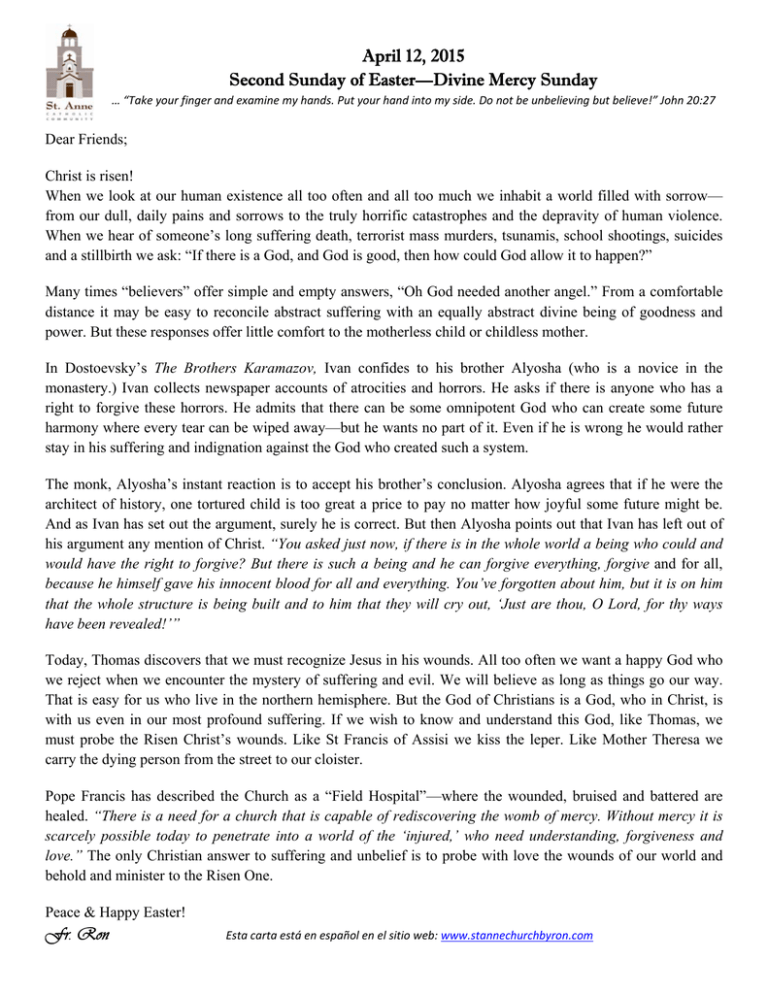
April 12, 2015 Second Sunday of Easter—Divine Mercy Sunday … “Take your finger and examine my hands. Put your hand into my side. Do not be unbelieving but believe!” John 20:27 Dear Friends; Christ is risen! When we look at our human existence all too often and all too much we inhabit a world filled with sorrow— from our dull, daily pains and sorrows to the truly horrific catastrophes and the depravity of human violence. When we hear of someone’s long suffering death, terrorist mass murders, tsunamis, school shootings, suicides and a stillbirth we ask: “If there is a God, and God is good, then how could God allow it to happen?” Many times “believers” offer simple and empty answers, “Oh God needed another angel.” From a comfortable distance it may be easy to reconcile abstract suffering with an equally abstract divine being of goodness and power. But these responses offer little comfort to the motherless child or childless mother. In Dostoevsky’s The Brothers Karamazov, Ivan confides to his brother Alyosha (who is a novice in the monastery.) Ivan collects newspaper accounts of atrocities and horrors. He asks if there is anyone who has a right to forgive these horrors. He admits that there can be some omnipotent God who can create some future harmony where every tear can be wiped away—but he wants no part of it. Even if he is wrong he would rather stay in his suffering and indignation against the God who created such a system. The monk, Alyosha’s instant reaction is to accept his brother’s conclusion. Alyosha agrees that if he were the architect of history, one tortured child is too great a price to pay no matter how joyful some future might be. And as Ivan has set out the argument, surely he is correct. But then Alyosha points out that Ivan has left out of his argument any mention of Christ. “You asked just now, if there is in the whole world a being who could and would have the right to forgive? But there is such a being and he can forgive everything, forgive and for all, because he himself gave his innocent blood for all and everything. You’ve forgotten about him, but it is on him that the whole structure is being built and to him that they will cry out, ‘Just are thou, O Lord, for thy ways have been revealed!’” Today, Thomas discovers that we must recognize Jesus in his wounds. All too often we want a happy God who we reject when we encounter the mystery of suffering and evil. We will believe as long as things go our way. That is easy for us who live in the northern hemisphere. But the God of Christians is a God, who in Christ, is with us even in our most profound suffering. If we wish to know and understand this God, like Thomas, we must probe the Risen Christ’s wounds. Like St Francis of Assisi we kiss the leper. Like Mother Theresa we carry the dying person from the street to our cloister. Pope Francis has described the Church as a “Field Hospital”—where the wounded, bruised and battered are healed. “There is a need for a church that is capable of rediscovering the womb of mercy. Without mercy it is scarcely possible today to penetrate into a world of the ‘injured,’ who need understanding, forgiveness and love.” The only Christian answer to suffering and unbelief is to probe with love the wounds of our world and behold and minister to the Risen One. Peace & Happy Easter! Fr. Ron Esta carta está en español en el sitio web: www.stannechurchbyron.com Abril 12, 2015 Segundo Domingo de Pascua—Domingo de la Divina Misericordia … Toma tu dedo y examina mis manos. Pon tu mano en mi costado. ¡No seas incrédulo pero cree!" Juan 20:27 Queridos Amigos; ¡Cristo ha resucitado! Cuando nos fijamos en nuestra existencia humana muy a menudo habitamos un mundo lleno de penas, desde nuestro dolor y pena cotidiana hasta las horribles catástrofes y la depravación de la violencia humana. Cuando oímos hablar de la larga y sufrida muerte de alguien, de asesinatos terroristas, tsunamis, tiroteos escolares, suicidios y un niño nacido muerto pedimos: "Si hay un Dios y Dios es bueno, entonces ¿cómo puede Dios permitir que esto suceda?" Muchas veces los "creyentes" dan respuestas simples y vacías, "Oh Dios necesitaba a otro ángel." Desde una cómoda distancia puede ser fácil de conciliar el sufrimiento abstracto con un igualmente divino ser abstracto de bondad y poder. Pero estas respuestas ofrecen poco consuelo al niño huérfano o a una madre sin hijos. En los hermanos Karamazov de Dostoievski, Iván confía a su hermano Aliosha (quien es un novato en el monasterio). Ivan recolecta artículos de periódico de atrocidades y horrores. El pregunta si hay alguien que tiene derecho a perdonar a estos horrores. Admite que puede haber un Dios omnipotente que puede crear una armonía futura donde cada lágrima puede ser borrada, pero no quiere ninguna parte de él. Aun si está equivocado preferiría permanecer en su sufrimiento y su indignación contra el Dios que creó tal sistema. La reacción instantánea del monje Alyosha es aceptar la conclusión de su hermano. Alyosha acepta que si él fuera el artífice de la historia, un niño torturado es un precio demasiado alto a pagar sin importar que tan alegre podría ser un futuro. Y como Ivan ha establecido el argumento, seguramente tiene razón. Pero entonces Alyosha señala que Ivan ha dejado fuera de su argumento, cualquier mención de Cristo. ¿"Preguntaste, si existe en todo el mundo un ser que podría y tendría derecho a perdonar? Pero hay un ser y puede perdonar todo, perdonar y para todos, porque él mismo dio su sangre inocente para todos y todo. Te has olvidado de él, pero es en el en que toda la estructura se está construyendo y al el que gritarán, ¡'Sólo tú, Oh Señor, pues tus caminos han sido revelados!' " Hoy en día, Tomas descubre que hay que reconocer a Jesús en sus heridas. Demasiado a menudo queremos un Dios feliz que rechazamos cuando nos encontramos con el misterio del sufrimiento y del mal. Creeremos mientras las cosas vayan a nuestro favor. Es fácil para nosotros quienes vivimos en el hemisferio norte. Pero el Dios de los cristianos es un Dios, quien en Cristo, sufre con nosotros en nuestro sufrimiento más profundo. Si queremos conocer y entender a este Dios, como Tomas, nosotros debemos sondear las heridas de Cristo resucitado. Como San Francisco de Asís, besamos al leproso. Como la Madre Teresa llevamos al moribundo de la calle a nuestro claustro. El Papa Francis ha descrito a la iglesia como un "Hospital", donde los heridos, magullado y maltratados son sanados. "Hay una necesidad de una iglesia que es capaz de redescubrir el vientre de la misericordia. Sin piedad es casi imposible penetrar en un mundo de los 'heridos', que necesita comprensión, perdón y amor". La única respuesta Cristiana al sufrimiento y la incredulidad es sondear con amor las heridas de nuestro mundo y contemplar y ser ministro del Cristo Resucitado. ¡Paz & Felices Pascuas! Fr. Ron Esta carta está en español en el sitio web: www.stannechurchbyron.com

